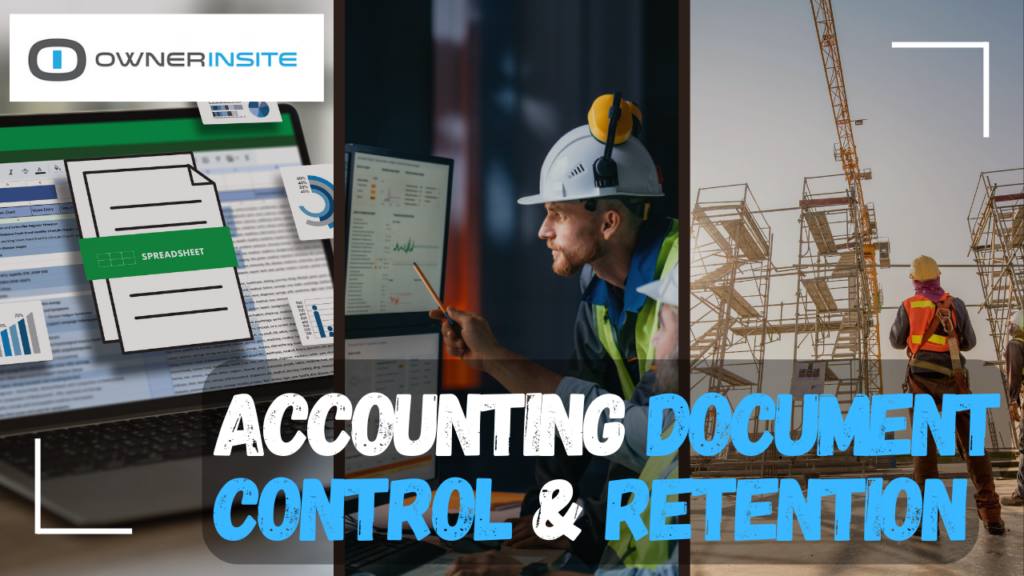When considering document control and retention in the construction industry, you probably think about drawings, ITPs, change orders, and RFIs. But while all those things are essential, large-scale construction projects generate vast amounts of accounting-related documents.
In this article, we will look at the type of accounting documents you need to retain and archive and why they are essential not only during the active construction phase of the project but also to substantial completion and beyond.
What Kind of Accounting Documents Do Construction Projects Generate?
Construction accounting differs from most business finance processes in that many construction professionals are involved before any paperwork makes it to your accounting office to be paid and processed.
There are also many supporting documents that need to be submitted alongside invoices and other standard accounting documents like invoices. All of those things also need to be retained to maintain a complete picture of the financial lifespan of your project. Some of those additional documents might include:
- Change orders that officially alter the contract price of a project
- Progress billing breakdowns that are submitted with monthly invoices
- Escalation clause-related requests that might increase the cost of some or all parts of the contract
- Subcontractor invoices and progress billing submissions
- Waivers of lien and statutory declarations submitted for holdback release
These are just some documents that will directly affect accounting and finance on a construction project. Some will contain pricing and figures, but others are simply supporting documents for invoices or submittals. They all form part of the overall project accounting system, though, and they’re all essential parts of the lifecycle documentation of any project.
Why Do You Need to Manage Accounting Document Control & Retention in Construction?
Most people know that businesses need to retain financial information for prescribed periods. Organizations like the IRS set these periods as legal requirements for doing business.
However, if you’re the project owner behind a construction project, there are several reasons why you want to expand your accounting and financial document retention beyond the minimum requirements.
1. To Defend Against Liens
Sometimes, when a general contractor does not pay a supplier or sub-trade, they choose to get a lien on the property they worked on. However, property owners can defend against that kind of action by proving that they have paid all outstanding amounts related to the contract.
The best way to do that is by getting a waiver of contractor’s lien from your general contractors when you pay them and by ensuring they sign statutory declarations stating that they have paid all their subcontractors and suppliers. You don’t always know when a contractor is not meeting their financial obligations, and these documents help to insulate you from any legal action that might be taken against them.
2. For Tax Purposes
Construction projects are enormous, complex, multi-faceted undertakings that can take many years to complete and employ hundreds of people or more.
All of that requires an enormous amount of tax-related documentation, and even if you’re not their direct employer, as the project owner, you could be asked to provide information in case of a discrepancy.
Maintaining proper accounting document control and retention for your construction projects makes finding relevant information much more effortless.
3. In Case of Budget Inquiries
Even as the project or property owner, you’re never entirely immune to budget and finance inquiries, especially if your project significantly exceeds the expected budget.
Whether it’s a public inquiry for a government-funded project or explaining the overages to your board of directors, having a clear paper trail and an answer to every question is critical.
4. To Learn from Past Mistakes
One little-known fact about successful construction companies is that they all keep meticulous records of how they priced specific projects, what financial challenges they faced, and what affected productivity during the project.
They do that so that the next time they have to price a similar project, they can learn from past mistakes and avoid making them again. Proper accounting document control and retention allows your team to do the same by conducting a post-project post-mortem assessment and avoiding issues affecting construction finances on future projects.
5. For Future Warranty and Other Claims
Some of the construction accounting documentation generated by your project might be required in the event that you ever need to lodge a warranty claim against a supplier or service provider. You might also need to prove certain purchases if the company you did business with is bought out or amalgamates with another company at some point in the future.
Construction accounting documentation is often required in various kinds of litigation related to product or design failure, latent defects, etc. So it’s always a good idea to keep it as accessible as possible.
6. Accountability
Sometimes, you need to know who authorized additional spending and why. Instead of relying on emails and meeting minutes, construction accounting documents should tell the project team exactly who signed off on each budget adjustment, when, and most importantly, for what reason.
Easy to Access, Digital Accounting Document Control and Retention for Construction
When we first decided to build Owner Insite, we were driven to solve problems we knew property and project owners were regularly facing.
Many of those problems are directly related to document control, retention, and access, and that’s why we built some of the best digital document control tools into our platform. This is where our project archive will ensure you have complete ownership and document control in perpetuity. Your archive will make you compliant with your state document retention requirements.
Owner Insite offers easy, secure cloud-based storage for your essential accounting, finance, and other documents and makes it easy to search and find the documents you need when you need them.
Accounting software is excellent for balancing books, but it’s not very good at cataloguing and storing important construction accounting documents or helping you to find them when needed.
So, if you’re ready to simplify and streamline your accounting document control and retention for construction projects, contact us, the Owner Insite team. We’ll be happy to show you how easy it can be to find and access the construction accounting documents you need at a moment’s notice.




